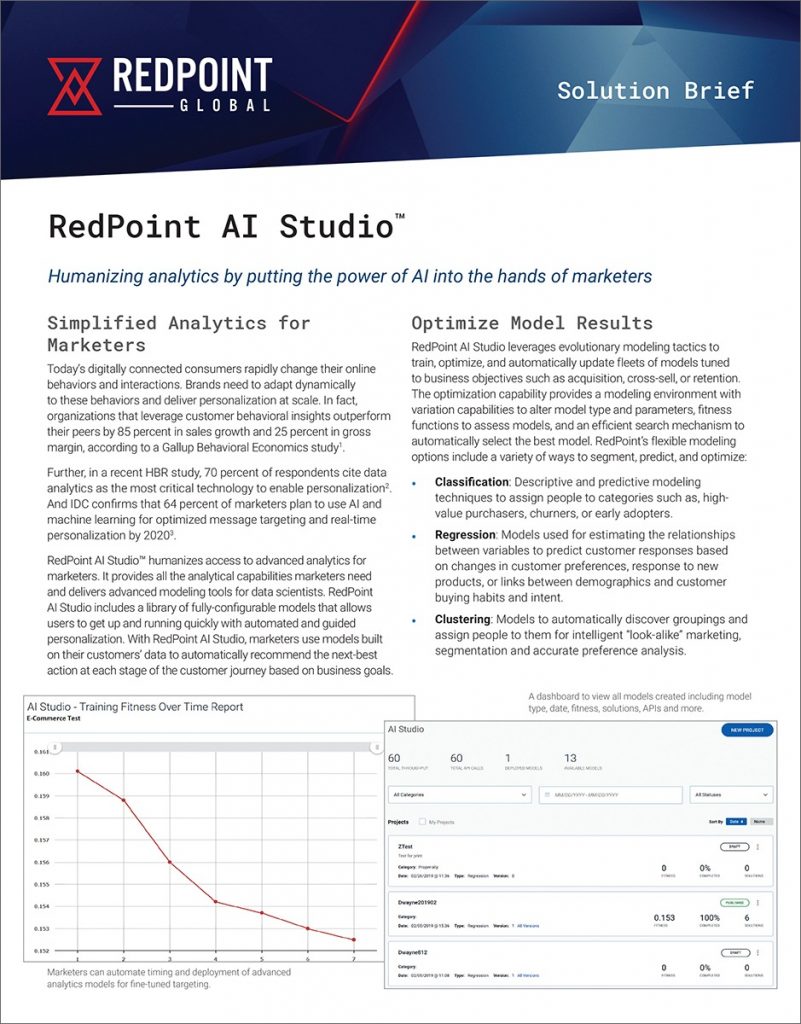 Gartner defines automated machine learning – which it calls AutoML – as the capability of automating the process of building, deploying, and managing machine learning models. It sits at the peak of Gartner’s 2019 Hype Cycle for Artificial Intelligence, one of eight new “AI-based technologies” that reflect enterprise clients’ plans to scale AI across DevOps and IT while supporting new business models. Reflecting its increased prominence, many companies now provide stand-alone automated machine learning platforms, among them Amazon SageMaker, Big Squid, and Google Cloud Platform.
Gartner defines automated machine learning – which it calls AutoML – as the capability of automating the process of building, deploying, and managing machine learning models. It sits at the peak of Gartner’s 2019 Hype Cycle for Artificial Intelligence, one of eight new “AI-based technologies” that reflect enterprise clients’ plans to scale AI across DevOps and IT while supporting new business models. Reflecting its increased prominence, many companies now provide stand-alone automated machine learning platforms, among them Amazon SageMaker, Big Squid, and Google Cloud Platform.
These vendor offerings give marketers a lot to think about as far as what automated machine learning can do for their organizations. First, though, marketers must have a clear purpose in mind. Machine learning tailored for marketing is, at its core, about taking large sets of data that represent customer information and behaviors and turning it into predictive or prescriptive models for driving customer interactions. In other words, to understand how past customer behaviors drive marketers’ understanding of future expectations.
Machine Learning for Marketers
With this in mind, there are three important things for marketers to know before bringing automated machine learning to bear. One is that the understanding of customer behaviors presupposes a subject matter expertise, and this knowledge is crucial to ensure that machine learning models are optimized for a specific business purpose. This affects which variables correlate or aggregate to represent the modeling goal, for instance reducing churn or selecting high-value customers. Out-of-the-box machine learning, broadly suited for use cases not specific for marketers, will lack this important in-house knowledge.
Second, and in a similar vein, most machine learning platforms are geared toward data scientists rather than marketers. The platforms thus leave many high-value tasks outside the realm of automation, entrusting data scientists with data quality tasks such as record matching, cleansing, and normalization. This presents a roadblock for marketers who need instant access to a persistently updated unified customer profile, or golden record, that is needed to deliver a differentiated customer experience with personalization, a key to driving revenue.
Third, in addition to data preparation, standalone machine learning platforms that are often built as a web services model will often require manual intervention or programming tasks before integrating the platform into an existing martech stack. Core tasks around building and improving models are automated, but model validation, deployment to a marketing platform, and model assessment will generally not be automated – all of which are important to feed customer data to the models and tie models into specific campaigns.
To summarize, for automated machine learning to optimize a specific marketing-related business case requires a subject matter expertise about customers, a knowledge about the underlying mechanisms to build a model, and an understanding about the relationships between various components of the martech stack.
The More the Merrier
Despite the built-in challenges, marketers should welcome having more vendors enter the competitive machine learning fray, if only to help them focus their ambitions and nail down a use case. Because the question is not whether automated machine learning will transform marketers’ ability to offer a hyper-personalized customer experience, but which platform will best lead to that result. Even more good news is that vendors do not rest on their laurels. They’re always refining the platform’s intelligence, simplifying the mechanisms for making models available, and continuing to build on automating the mechanisms for building effective models.
That leaves a deep understanding of the customer, and an understanding of how models operate in the context of intelligent orchestration – the automated data quality tasks – as the two major roadblocks for marketing organizations that are kicking the tires on automated machine learning platforms.
The bottom line for marketers considering an automated machine learning platform is how much work they’re willing to take on to complete those tasks. Many customer data platforms on the market today are proficient with solving the front-end problem of bringing in enough customer data, even though the depth of customer understanding will vary depending on how well the CDP solves for advanced identity resolution and other capabilities. Some CDPs are even adept at providing an orchestration layer and the right mechanisms to incorporate machine learning models in them.
In-Line Analytics Makes a Difference
CDPs that solve for both the front and back-end, with an automated machine learning platform that solves for the data quality tasks, identity resolution, and intelligent orchestration are few and far between, however. Purpose-built to deliver a hyper-personalized customer experience, the Redpoint Customer Engagement Hub automates every task related to data ingestion, cleansing, matching, and normalization. Redpoint Automated Machine Learning (AML) – a core component of the hub – provides in-line analytics and machine learning for marketers and easily deploys models to add machine-learning insights to martech orchestration. Tuned for a specific business metric, AML provides continuous automated optimization of customer interactions, delivering a real-time next-best action or offer to a customer that is always in the context and cadence of a dynamic customer journey. AML uses evolutionary AI, testing, selecting, and rerunning variant models to find the best approach to solve the marketer’s specific business problem without continual attention from data scientists and engineers.
Marketing organizations are rightly looking to automated machine learning to deliver personalized customer experiences at scale that are increasingly proving to be a fast path to revenue. While it is encouraging that vendors are racing to enter the automated machine learning platform market, marketers must recognize that one size does not fit all. Before researching options, marketers must have a firm understanding of their intentions for how automated machine learning will enhance customer engagement strategy.
RELATED CONTENT
Key Questions to Ask When Evaluating an Enterprise CDP
The Sky is the Limit with AI and Machine Learning: Capitalize on the Moment of Interaction
Evolutionary Programming: Survival of the “Fittest” Data Models

